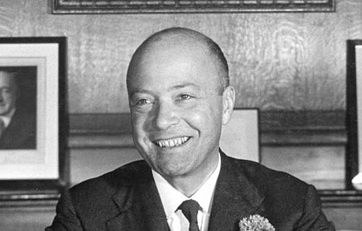Hadding Scott
National-Socialist Worldview
April 9, 2015

His paternal grandfather was John Christian Bullitt, whose statue stands at the city hall of Philadelphia. But his mother was Louisa Gross Horwitz, whose name indicates that she was a Jewess.
As the Jewish scion of a prominent and reputable Anglo-Saxon family, this William Christian Bullitt, Jr. was like a cuckoo in a robins’ nest. Newspaper-columnist Jack Stinnett wrote of him:
William Christian Bullitt revolted against the conservatism of the Philadelphia society into which he was born before the New Deal was ever heard of, and was an enthusiast for the U.S.S.R. before the blood of the revolution had been mopped up. [Jack Stinnett, Reading Eagle, 14 December 1941]
Westbrook Pegler described Bullitt’s early diplomatic career as follows:
In 1917 at the age of 26, Bullitt having family connections was an “assistant” in the State Department. God knows why. When Saint Woodrow went to Paris, Bullitt somehow became an “attaché” of our peace mission. But he soon found himself in Moscow with the Communist Lincoln Steffens, on a mission of which Steffens reported, “We have seen the future and it works!”
Wickham Steed, the editor of Northcliffe’s London Times, learned that Bullitt and Steffens were working for recognition of Lenin and Trotsky so he wrote a loud editorial which queered that deal. Steed learned that Wilson’s Rasputin, Col. E. M. House, had sent Bullitt and Steffens on this trip for this purpose. Steed reported that Jacob Schiff and Felix Warburg, the New York bankers, were “prime movers” to bolster the Trotsky regime to “secure a field for exploitation of Russia.” [Westbrook Pegler, Reading Eagle, 17 May 1961]
Thus, already at the time of the First World War, William Bullitt was a trusted emissary of International Finance-Jewry.
In 1933, upon the election of President Franklin Roosevelt, the Soviet Union was granted diplomatic recognition and William Christian Bullitt was made the first US ambassador to that government. Bullitt’s stay in Moscow ended in 1936 after it was revealed that Bullitt had been involved in illegal trading of Soviet currency. Unbelievably, Bullitt was reassigned as ambassador to France.
A famous passage in the diaries of Admiral James Forrestal contains an important revelation from Joseph Kennedy (US ambassador to Britain and father of the future President John F. Kennedy) about Bullitt’s activities as ambassador to France:
Played golf today with Joe Kennedy. I asked him about his conversations with Roosevelt and Neville Chamberlain from 1938 on. He said Chamberlain’s position in 1938 was that England had nothing with which to fight and that she could not risk going to war with Hitler. Kennedy’s view: That Hitler would have fought Russia without any later conflict with England if it had not been for Bullitt’s urging on Roosevelt in the summer of 1939 that the Germans must be faced down about Poland; neither the French nor the British would have made Poland a cause of war if it had not been for the constant needling from Washington. Bullitt, he said, kept telling Roosevelt that the Germans wouldn’t fight, Kennedy that they would, and that they would overrun Europe. Chamberlain, he says, stated that America and the world Jews had forced England into the war. In his telephone conversation with Roosevelt in the summer of 1939 the President kept telling him to put some iron up Chamberlain’s backside.[The Forrestal Diaries, entry dated 27 December 1945]
Given that the conquest of Poland happened in the last three weeks of the summer of 1939, Bullitt’s urging “in the summer of 1939” that the Germans be “faced down about Poland” seems to refer to the situation before the outbreak of military hostilities. In that period, the issue was Germany’s military vulnerability due to the long border with Poland, and Hitler’s attempt to reach an accommodation with Poland that would ameliorate this, which was met instead with belligerence from the Polish side, emboldened by empty guarantees from Britain and France. After the conquest of Poland, the issue was whether to accept Hitler’s peace-offer to Britain and France, which included restoring a reduced Polish state. Facing down Germany about Poland after the conquest of Poland was blatantly hypocritical, since the eastern half of the country had been seized by the Soviet Union. There was no time when inflexibly facing down Germany about Poland was a reasonable course of action.
Forrestal’s note is unambiguous that it was Bullitt who prevailed upon the elderly invalid President Roosevelt (who, if his son-in-law Curtis Dall may be believed, was easily manipulated), with the result that Britain was coerced to take a hard line against Germany, on the unlikely (at least insofar as Kennedy protested that it was unlikely) premise that the Germans would back down.
If not for Bullitt’s influence on Roosevelt, in the assessment of Ambassador Joseph Kennedy Germany would have destroyed the Soviet Union — which to most of the world would have appeared as a benefit — without ever fighting Britain or France. There would have been no repetition of the World War.
